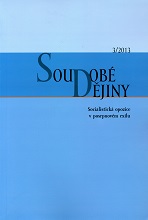Dva přístupy ke komunistické historiografii a absence otázky „národního komunismu“
Two Approaches to Communist Historiography and the Absence of the Question of ‘National Communism’
Author(s): Michal KopečekSubject(s): History
Published by: AV ČR - Akademie věd České republiky - Ústav pro soudobé dějiny
Summary/Abstract: The author compares two publications on the history of historiography in Communist Czechoslovakia until the end of the 1960s: Vítězslav Sommer’s Angažované dějepisectví: Stranická historiografie mezi stalinismem a reformním komunismem (1950–1970) (Engagé history writing: Party historiography between Stalinism and Reform Communism, 1950–70) (Prague: Nakladatelství Lidové noviny and the Filozofická fakulta Univerzity Karlovy, 2011) and Adam Hudek’s Najpolitickejšia veda: Slovenská historiografia v rokoch 1948–1968 (The most political science: Slovak historiography, 1948–68) (Bratislava: Historický ústav Slovenskej akadémie vied, 2010). Hudek, a Slovak historian, traces the twists and turns of national history as part of the building and operation of Slovak Marxist-Leninist historiography, his interpretation develops in a genealogical perspective and his approach can reasonably be called an intellectual history of historiography in the context of Slovak nationalism and Czechoslovak Communism. By contrast, Sommer, a Czech historian, explores the emergence and operation of Czech ‘Party’ historiography in the same period and has chosen a structural perspective. His approach can reasonably be described as a social history of Communist historiography. Though he has high regard for both works, the reviewer sees Hudek’s work as problematically judgemental and highly normative, and he argues that a weakness of Sommer’s work is its failure to place the emerging historical narrative of Czechoslovak Communism into the wider context of contemporaneous Czech historiography and the national story. He then asks whether both publications should not have considered the still neglected problem of the origin, nature, and role of Czech and Slovak ‘national Communism’, which had an important influence on the patterns of historical thinking and their identity-forming importance for Czechoslovak society at the time.
Journal: Soudobé Dějiny
- Issue Year: XX/2013
- Issue No: 03
- Page Range: 400-405
- Page Count: 6
- Language: Czech

